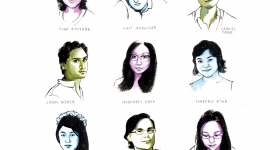There are, to be simplistic, two types of stories. One is the story of ordinary people, whose strength and weaknesses we see refracted in our own ordinary lives. Then there are the stories of extraordinary people. Their births are heralded by omens, and their only flaw is the “fatal flaw” that will also be their downfall. These are the stories deemed “epic,” and Tiger Hills, the debut novel of Sarita Mandanna, is undoubtedly striving to earn that distinction.
Of the novel’s three main characters, Devanna is extraordinarily beautiful, Devi -- who has secretly been in love with Devanna since childhood -- is extraordinarily smart, and Machu the tiger killer -- whom Devanna vowed to marry at first sight -- is extraordinarily brave. And the love triangle is extraordinarily tragic. Lest you think I’m exaggerating, here are the novel’s own words used to describe the far-reaching actions of a minor character: “innocent of the wheels he would set in motion, of the catastrophic consequences his actions would bring, Gundert turns out the lamp and went finally to bed.” Through sheer force of storytelling, Tiger Hills is not the type of novel to send its reader to bed early. It is a brisk, entertaining read, but the plot and characters tread on well-worn tropes and archetypes. Calling it an Indian version of The Thorn Birds as shorthand would not be inaccurate.

Like The Thorn Birds, the scope and setting of Tiger Hills are epically scaled. It spans 30 years on either side of the turn of the 20th century, following multiple generations of a family in Coorg, a region in southern Indian whose beautiful landscapes are the subject of many florid sentences. Just as the novel’s characters stand on pedestals, so too is Coorg described as an exotic, nearly mystical locale untainted by British colonial rule. Mandanna, the author, is a native of Coorg herself, and descriptions of village life are thick with Indian words: “Wide adigé collars of uncut rubies banded their necks, and ropes of golden-beaded jomalé, and coral pathaks ... Half-moon kokkéthathis of seed pearls and gold swung at their breast.” Tiger Hills is the type of book that requires a glossary of terms and a family tree for reference, both helpfully included in the hardcover edition.
Devanna’s birth marks the beginning of the novel. We then follow her childhood growing up with Devi and her fateful meetings with Machu. As times passes, these characters age, becoming parents themselves, and India moves on the path toward modernization. The Western world creeps into the hitherto unspoiled region of Coorg, bringing with it world war, boarding schools, and social clubs. Although the second generation of children is populated by characters of comparable beauty or charisma, they seem a pale echo of the early generation, lacking their parents’ strong wills. Modernization is certainly not depicted as an evil, but the novel is nostalgic for those earlier times that were simply more epic. Machu’s son is a great hockey player, but his father was a tiger killer.
With its attractive characters, scenic locations, and rapid pacing, Tiger Hills would be a natural fit for the cinema. A bestseller in India -- Penguin India also paid its largest advance ever for the book -- it seems likely that an adaptation will be made. Mandanna’s occasionally overripe prose used in describing the beauty of Coorg would do well translated to the screen by a good cinematographer. Too early to judge of course, but there’s a chance you may just want to wait for the movie instead.
Sarah Zhang is a writer based on Cambridge, MA. She is the online editor of The New Inquiry.









Comments